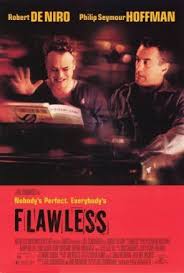
FLAWLESS
US, 1999, 112 minutes, Colour.
Robert De Niro, Philip Seymour Hoffman, Barry Miller, Rory Cochrane.
Directed by Joel Schumacher.
Joel Schumacher has had a full-flight career during the 90s, two Batman movies, two Grisham adaptations (The Client, A Time for Killing), two Julia Roberts vehicles (Flatliners, Dying Young), an arresting drama of mid-life crisis (Falling Down) and an excursion into the world of pornography and gangsters (8 mm). His movies are melodramas with a touch of the lurid. It is the same with this very interesting and entertaining film. Put Robert de Niro as a heroic, now retired, lonely homophobic cop who has a stroke, with his annoying neighbour, drag queen, Philip Seymour Hoffman, depending on him for singing lessons to develop his voice and control. Add in the friendly cops, the local drug-dealers and some robberies and killings, as well as the Miss Flawless ball and competition and you have Flawless.
Both actors are excellent and the film makes you think (well not everyone as I heard with the man leaving the cinema with four letter condemnations of the worst film he had ever seen). De Niro is strong but Hoffman (after Boogie Nights, Patch Adams, Happiness, Talented Mr Ripley, Magnolia) shows he is one of the most versatile actors in the US.
1. The title, flaws, disabilities? The contrast with perfection? The application of the title to Walt and to Rusty?
2. The Los Angeles atmosphere, the city, apartments, dingy, streets, drag queen clubs, not a flawless area of the city?
3. The colour and tone, the real grit and the atmosphere, the contrast with the camp style, costumes and décor? The score, the songs?
4. The camp tone, Rusty in himself, his friends, the group of gay Republicans, the flawless beauty competition, the drag queens and their performance, the issues of transgender operations and issues?
5. The audience identifying with Walt and/or Rusty? Ordinary attitudes, especially towards the gays and their camp style? The homophobia abuse and mockery? The lack of understanding on the part of Walt? Its effect on the audience? The possibility for the film and the characters to change people’s perceptions?
6. The theme of friendship, impossible friendships, the past clashes, the disregard and mockery, the development for needs and dependence, exploitation, senses of superiority? Talking, sharing, understanding, the risks – the ups and downs yet the reconciliation?
7. Walt and his record, his awards, bravery, the newspaper items, the story of his wife, her leaving with his friend? Retired, his police friends and the card games? The dingy hotel, the types who lived there, the old lady, Leonard Wilcox, the drug connections? Walt’s hearing the shooting, the screaming, his going into action? The attack on the steps, his stroke? Hospital, the doctors’ treatment, the advice? Going home, his carer and the Afro-American? references?
8. Rusty, personality, style, the group of friends, appearing in drag, their noise, giggling, going to the club, his performance, the clients, playing the piano, the singers? His saying he was a singer rather than a drag queen? Ultimately admitting the truth?
9. Walt, Robert De Niro and his style? His asking Rusty for help, his motivation, considering himself better than Rusty, the humiliation? The lessons, success and failure? Walt stopping them? Starting again, the progress? The songs?
10. The effect of the lessons on each, the ups and downs of their interactions, each revealing their family story?
11. Rusty and his life, the play when he was at school, wearing the dress, changing his life, planning for the operation, getting the money, working for the money (and stealing the money)?
12. The portrait of the drug dealers, the initial chase, the pursued man hiding, his girlfriend? The confrontation with the pursuers, the shootings, deaths? Rusty and the funeral for the girl, the ashes and their being spilt? The dealers and their searching the hotel, every room? The confrontation with the manager, the girl escaping and going on the street?
13. The irony of Rusty, the issue of the money, hiding it in his girdle?
14. The build-up to the showdown, the shootings, Walt being wounded, Rusty blocking the door, the fight on the steps, Rusty and the drainpipe, the dangers? The guns, Walt shooting? The deaths and arrests?
15. The gang suspecting Leonard Wilcox, his helping them with information, their attack on his mother?
16. The flawless competition, the men and their dresses, the disputes, the factions? The background of the meeting with the gay Republicans? The winner of the competition?
17. Walt, the ambulance, being taken away, Rusty saying that it was his sister, Walt accepting this and going in the ambulance? Symbolism of the reconciliation?
18. The film as drama, as performance by its stars, as a portrait of tolerance moving to understanding?